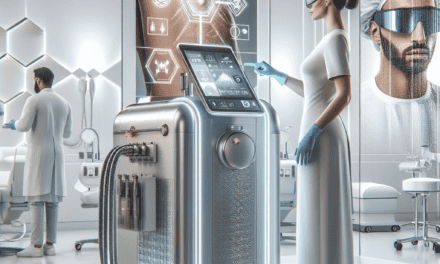Transforming Healthcare: AI’s Role in Uniting Medical Practice and Revenue Management

The healthcare industry is undergoing a significant transformation, driven by the integration of artificial intelligence (AI) into various facets of medical practice and revenue management. As healthcare providers strive to deliver high-quality care while maintaining financial viability, AI emerges as a powerful tool to bridge the gap between clinical excellence and economic sustainability. This article explores the multifaceted role of AI in uniting medical practice and revenue management, highlighting its potential to revolutionize healthcare delivery and financial operations.
The Evolution of AI in Healthcare
Artificial intelligence has evolved from a futuristic concept to a practical tool that is reshaping the healthcare landscape. Initially, AI applications in healthcare were limited to research and development, but recent advancements have enabled its integration into clinical practice and administrative functions. This section delves into the historical context and current state of AI in healthcare, setting the stage for its transformative potential.
Historical Context and Technological Advancements
The journey of AI in healthcare began with early experiments in the 1960s, focusing on rule-based systems for diagnosing diseases. However, it wasn’t until the advent of machine learning and big data analytics in the 21st century that AI gained traction in the medical field. The proliferation of electronic health records (EHRs) and the availability of vast datasets have fueled AI’s growth, enabling more sophisticated algorithms and predictive models.
Technological advancements, such as natural language processing (NLP) and deep learning, have further expanded AI’s capabilities. NLP allows AI systems to interpret and analyze unstructured data, such as clinical notes and patient narratives, while deep learning models excel in image recognition tasks, making them invaluable in radiology and pathology.
Current Applications in Clinical Practice
AI’s integration into clinical practice is evident in various domains, including diagnostics, treatment planning, and patient monitoring. AI-powered diagnostic tools, such as IBM Watson Health and Google’s DeepMind, have demonstrated remarkable accuracy in identifying diseases like cancer and diabetic retinopathy. These systems analyze medical images and patient data to provide clinicians with actionable insights, enhancing diagnostic accuracy and reducing human error.
In treatment planning, AI algorithms assist in personalizing therapies based on individual patient profiles. For instance, AI-driven platforms analyze genetic data to recommend targeted therapies for cancer patients, optimizing treatment outcomes and minimizing adverse effects. Additionally, AI-powered wearable devices continuously monitor patients’ vital signs, enabling early detection of health anomalies and timely interventions.
AI in Administrative Functions
Beyond clinical applications, AI is revolutionizing administrative functions in healthcare, particularly in revenue management. AI-driven solutions streamline billing processes, automate claims management, and enhance revenue cycle efficiency. By analyzing billing codes and patient data, AI systems identify discrepancies and optimize reimbursement processes, reducing revenue leakage and improving financial performance.
Moreover, AI-powered chatbots and virtual assistants enhance patient engagement and streamline appointment scheduling, reducing administrative burdens on healthcare staff. These tools provide patients with instant access to information and support, improving overall patient satisfaction and loyalty.
Challenges and Ethical Considerations
Despite its potential, AI in healthcare faces several challenges and ethical considerations. Data privacy and security are paramount concerns, as AI systems rely on vast amounts of sensitive patient information. Ensuring compliance with regulations like the Health Insurance Portability and Accountability Act (HIPAA) is crucial to protect patient confidentiality.
Additionally, the ethical implications of AI decision-making in healthcare must be addressed. The potential for algorithmic bias and the lack of transparency in AI models raise concerns about fairness and accountability. Healthcare providers must implement robust governance frameworks to ensure ethical AI deployment and mitigate potential risks.
The Future of AI in Healthcare
The future of AI in healthcare holds immense promise, with ongoing research and development paving the way for innovative applications. Emerging technologies, such as explainable AI and federated learning, aim to enhance transparency and data privacy, addressing some of the current challenges.
As AI continues to evolve, its integration into healthcare will likely expand, encompassing areas like precision medicine, telehealth, and population health management. By harnessing AI’s potential, healthcare providers can achieve a harmonious balance between clinical excellence and financial sustainability, ultimately transforming the healthcare landscape.
AI-Driven Diagnostics: Enhancing Accuracy and Efficiency
AI-driven diagnostics represent one of the most promising applications of artificial intelligence in healthcare. By leveraging advanced algorithms and machine learning models, AI systems can analyze complex medical data with unprecedented accuracy and speed. This section explores how AI is revolutionizing diagnostics, improving patient outcomes, and streamlining clinical workflows.
AI in Medical Imaging
Medical imaging is a critical component of diagnostics, and AI has made significant strides in this domain. AI algorithms excel in image recognition tasks, enabling them to detect abnormalities in medical images with high precision. For instance, AI-powered systems can identify tumors in radiology scans, such as X-rays, CT scans, and MRIs, often outperforming human radiologists in terms of accuracy and speed.
One notable example is the use of AI in mammography for breast cancer screening. Studies have shown that AI algorithms can detect breast cancer with a sensitivity comparable to that of expert radiologists, reducing false positives and unnecessary biopsies. This not only improves patient outcomes but also alleviates the workload on radiologists, allowing them to focus on more complex cases.
Pathology and AI
Pathology is another area where AI is making a significant impact. Traditional pathology involves the manual examination of tissue samples under a microscope, a time-consuming and subjective process. AI-powered digital pathology platforms automate this process by analyzing digitized slides and identifying patterns indicative of diseases.
For example, AI algorithms can accurately classify different types of cancer based on histopathological images, aiding pathologists in making more informed diagnoses. This not only enhances diagnostic accuracy but also reduces turnaround times, enabling faster treatment initiation for patients.
Genomics and Personalized Medicine
AI is also playing a pivotal role in genomics, a field that holds the key to personalized medicine. By analyzing vast amounts of genetic data, AI algorithms can identify genetic mutations associated with specific diseases, enabling early detection and targeted therapies.
In oncology, AI-driven genomic analysis helps identify actionable mutations in cancer patients, guiding the selection of targeted therapies that are more likely to be effective. This personalized approach not only improves treatment outcomes but also minimizes adverse effects, as therapies are tailored to the patient’s unique genetic profile.
AI in Laboratory Medicine
Laboratory medicine is another area where AI is enhancing diagnostic capabilities. AI algorithms can analyze laboratory test results, such as blood tests and urinalysis, to identify patterns indicative of diseases. This enables early detection of conditions like diabetes, cardiovascular diseases, and infectious diseases.
Moreover, AI-powered laboratory information systems streamline workflows by automating routine tasks, such as sample processing and result interpretation. This not only improves efficiency but also reduces the risk of human error, ensuring accurate and reliable test results.
Challenges and Future Directions
While AI-driven diagnostics offer numerous benefits, they also present challenges that must be addressed. Ensuring the accuracy and reliability of AI algorithms is crucial, as diagnostic errors can have serious consequences for patient care. Rigorous validation and continuous monitoring of AI systems are essential to maintain high standards of diagnostic accuracy.
Additionally, integrating AI into existing clinical workflows requires careful planning and collaboration between healthcare providers and technology developers. Training healthcare professionals to effectively use AI tools is also critical to maximizing their potential and ensuring seamless integration into clinical practice.
Looking ahead, the future of AI-driven diagnostics is promising, with ongoing research focused on developing more sophisticated algorithms and expanding their applications. As AI continues to evolve, it has the potential to revolutionize diagnostics, improving patient outcomes and transforming healthcare delivery.
AI in Revenue Cycle Management: Streamlining Financial Operations
Revenue cycle management (RCM) is a critical aspect of healthcare operations, encompassing the financial processes involved in patient care, from appointment scheduling to billing and collections. AI is playing an increasingly important role in streamlining RCM, enhancing efficiency, and optimizing financial performance. This section explores how AI is transforming revenue cycle management in healthcare.
Automating Billing and Coding
Billing and coding are essential components of revenue cycle management, but they are often complex and prone to errors. AI-powered solutions automate these processes by analyzing patient data and medical records to generate accurate billing codes. This reduces the risk of coding errors, which can lead to claim denials and revenue loss.
For example, AI algorithms can identify patterns in billing data to detect discrepancies and ensure compliance with coding guidelines. This not only improves billing accuracy but also accelerates the claims submission process, reducing the time it takes for healthcare providers to receive payments.
Enhancing Claims Management
Claims management is another area where AI is making a significant impact. AI-driven systems analyze claims data to identify patterns and trends, enabling healthcare providers to proactively address issues that may lead to claim denials. By automating the claims review process, AI reduces the administrative burden on staff and improves the efficiency of claims processing.
Moreover, AI-powered predictive analytics can forecast claim outcomes based on historical data, allowing providers to prioritize high-risk claims and take corrective actions before submission. This not only increases the likelihood of claim approval but also reduces the time and resources spent on appeals and resubmissions.
Improving Patient Payment Collections
Patient payment collections are a critical component of revenue cycle management, and AI is helping healthcare providers optimize this process. AI-driven platforms analyze patient data to assess their financial profiles and predict their likelihood of payment. This enables providers to tailor payment plans and communication strategies to individual patients, improving collection rates.
For instance, AI algorithms can segment patients based on their payment behavior and recommend personalized payment options, such as installment plans or discounts for early payment. This not only enhances patient satisfaction but also increases the likelihood of timely payments, improving cash flow for healthcare providers.
Enhancing Financial Analytics and Reporting
AI is also transforming financial analytics and reporting in revenue cycle management. By analyzing vast amounts of financial data, AI-powered analytics platforms provide healthcare providers with actionable insights into their financial performance. This enables providers to identify trends, monitor key performance indicators (KPIs), and make data-driven decisions to optimize revenue cycle operations.
For example, AI-driven analytics can identify areas of revenue leakage, such as underpayments or missed billing opportunities, allowing providers to take corrective actions and improve financial performance. Additionally, AI-powered reporting tools automate the generation of financial reports, reducing the time and effort required for manual data analysis.
Challenges and Future Directions
While AI offers numerous benefits in revenue cycle management, it also presents challenges that must be addressed. Ensuring data accuracy and integrity is crucial, as errors in financial data can have significant implications for revenue cycle operations. Healthcare providers must implement robust data governance frameworks to ensure the reliability of AI-driven insights.
Additionally, integrating AI into existing RCM systems requires careful planning and collaboration between healthcare providers and technology vendors. Training staff to effectively use AI tools is also critical to maximizing their potential and ensuring seamless integration into financial operations.
Looking ahead, the future of AI in revenue cycle management is promising, with ongoing research focused on developing more sophisticated algorithms and expanding their applications. As AI continues to evolve, it has the potential to revolutionize revenue cycle management, improving financial performance and transforming healthcare operations.
AI-Powered Patient Engagement: Enhancing the Patient Experience
Patient engagement is a critical component of healthcare delivery, influencing patient satisfaction, adherence to treatment plans, and overall health outcomes. AI is playing an increasingly important role in enhancing patient engagement by providing personalized, timely, and convenient interactions. This section explores how AI is transforming patient engagement in healthcare.
AI-Driven Virtual Assistants
AI-driven virtual assistants are revolutionizing patient engagement by providing patients with instant access to information and support. These virtual assistants, often powered by natural language processing (NLP), can answer patient queries, schedule appointments, and provide medication reminders, all through voice or text interactions.
For example, virtual assistants like Amazon’s Alexa and Google’s Assistant are being integrated into healthcare systems to provide patients with personalized health information and reminders. This not only enhances patient convenience but also reduces the administrative burden on healthcare staff, allowing them to focus on more complex tasks.
Personalized Health Recommendations
AI is also playing a pivotal role in providing personalized health recommendations to patients. By analyzing patient data, such as medical history, lifestyle factors, and genetic information, AI algorithms can generate tailored health recommendations that are specific to each patient’s needs.
For instance, AI-driven platforms can recommend personalized diet and exercise plans based on a patient’s health goals and preferences. This not only improves patient adherence to treatment plans but also enhances overall health outcomes by promoting healthy behaviors.
Remote Patient Monitoring
Remote patient monitoring is another area where AI is enhancing patient engagement. AI-powered wearable devices continuously monitor patients’ vital signs, such as heart rate, blood pressure, and glucose levels, providing real-time data to healthcare providers.
This enables providers to detect health anomalies early and intervene promptly, improving patient outcomes and reducing the need for hospitalizations. Additionally, remote monitoring empowers patients to take an active role in managing their health, enhancing their engagement and satisfaction with care.
AI in Telehealth
Telehealth has become an essential component of healthcare delivery, especially in the wake of the COVID-19 pandemic. AI is enhancing telehealth by providing patients with personalized and convenient virtual care experiences.
For example, AI-driven chatbots can triage patients based on their symptoms and direct them to the appropriate level of care, whether it’s a virtual consultation with a healthcare provider or self-care recommendations. This not only improves patient access to care but also optimizes healthcare resources by ensuring that patients receive the right level of care at the right time.
Challenges and Future Directions
While AI offers numerous benefits in patient engagement, it also presents challenges that must be addressed. Ensuring data privacy and security is crucial, as AI systems rely on sensitive patient information to provide personalized interactions. Healthcare providers must implement robust data protection measures to safeguard patient confidentiality.
Additionally, integrating AI into existing patient engagement strategies requires careful planning and collaboration between healthcare providers and technology vendors. Training staff to effectively use AI tools is also critical to maximizing their potential and ensuring seamless integration into patient care.
Looking ahead, the future of AI-powered patient engagement is promising, with ongoing research focused on developing more sophisticated algorithms and expanding their applications. As AI continues to evolve, it has the potential to revolutionize patient engagement, improving patient satisfaction and transforming healthcare delivery.
AI in Population Health Management: Improving Health Outcomes
Population health management is a critical component of healthcare delivery, focusing on improving health outcomes for entire populations by addressing social determinants of health and promoting preventive care. AI is playing an increasingly important role in population health management by providing actionable insights and enabling data-driven decision-making. This section explores how AI is transforming population health management in healthcare.
Predictive Analytics for Risk Stratification
Predictive analytics is a powerful tool in population health management, enabling healthcare providers to identify high-risk patients and intervene early to prevent adverse health outcomes. AI algorithms analyze vast amounts of data, such as medical history, lifestyle factors, and social determinants of health, to predict patients’ risk of developing chronic conditions or experiencing adverse events.
For example, AI-driven predictive models can identify patients at high risk of developing diabetes or cardiovascular diseases, allowing providers to implement targeted interventions, such as lifestyle modifications or preventive screenings. This not only improves patient outcomes but also reduces healthcare costs by preventing costly complications and hospitalizations.
AI in Care Coordination
Care coordination is another area where AI is making a significant impact in population health management. AI-powered platforms facilitate communication and collaboration among healthcare providers, ensuring that patients receive coordinated and comprehensive care.
For instance, AI-driven care coordination platforms can analyze patient data to identify gaps in care and recommend appropriate interventions, such as follow-up appointments or referrals to specialists. This not only improves care continuity but also enhances patient satisfaction by ensuring that patients receive timely and appropriate care.
Social Determinants of Health
Addressing social determinants of health is a critical component of population health management, and AI is playing a pivotal role in this area. By analyzing data on social determinants, such as income, education, and housing, AI algorithms can identify populations at risk of poor health outcomes and recommend targeted interventions.
For example, AI-driven platforms can identify communities with high rates of food insecurity and recommend interventions, such as nutrition education programs or partnerships with local food banks. This not only improves health outcomes but also promotes health equity by addressing the root causes of health disparities.
AI in Preventive Care
Preventive care is a cornerstone of population health management, and AI is enhancing its effectiveness by providing personalized recommendations and interventions. By analyzing patient data, AI algorithms can identify individuals who would benefit from preventive screenings or vaccinations and recommend appropriate interventions.
For instance, AI-driven platforms can identify patients who are overdue for cancer screenings or vaccinations and send personalized reminders to encourage adherence. This not only improves preventive care uptake but also reduces the incidence of preventable diseases, improving overall population health outcomes.
Challenges and Future Directions
While AI offers numerous benefits in population health management, it also presents challenges that must be addressed. Ensuring data accuracy and integrity is crucial, as errors in population health data can have significant implications for health outcomes. Healthcare providers must implement robust data governance frameworks to ensure the reliability of AI-driven insights.
Additionally, integrating AI into existing population health management strategies requires careful planning and collaboration between healthcare providers and technology vendors. Training staff to effectively use AI tools is also critical to maximizing their potential and ensuring seamless integration into population health initiatives.
Looking ahead, the future of AI in population health management is promising, with ongoing research focused on developing more sophisticated algorithms and expanding their applications. As AI continues to evolve, it has the potential to revolutionize population health management, improving health outcomes and transforming healthcare delivery.
Conclusion: The Future of AI in Healthcare
Artificial intelligence is poised to revolutionize healthcare by uniting medical practice and revenue management, enhancing patient care, and optimizing financial performance. From AI-driven diagnostics and revenue cycle management to patient engagement and population health management, AI is transforming every aspect of healthcare delivery.
As AI continues to evolve, its integration into healthcare will likely expand, encompassing areas like precision medicine, telehealth, and preventive care. By harnessing AI’s potential, healthcare providers can achieve a harmonious balance between clinical excellence and financial sustainability, ultimately transforming the healthcare landscape.
However, realizing the full potential of AI in healthcare requires addressing challenges related to data privacy, algorithmic bias, and integration into existing systems. Healthcare providers must implement robust governance frameworks and collaborate with technology vendors to ensure ethical and effective AI deployment.
In conclusion, AI’s role in uniting medical practice and revenue management is a testament to its transformative potential in healthcare. By embracing AI-driven innovations, healthcare providers can improve patient outcomes, enhance operational efficiency, and achieve financial sustainability, paving the way for a brighter future in healthcare.





